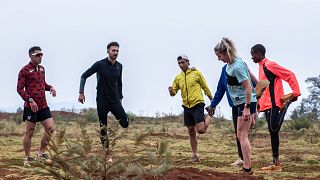Nigeria
Gamblers and experts say many punters see Africa's growing sports betting industry as a source of regular income, and a possible path out of poverty.
But critics warn its rise is underpinned by widespread poverty, unemployment and poor or non-existent regulation.
Continent-wide data on sports betting is not readily available, though snapshots from different countries show its growing popularity.
Online gaming platforms have enjoyed recent growth, driven by widening adoption of mobile payments and pandemic-era demand for digital entertainment.
Much of the betting focuses on soccer games in Europe, while more recently the World Cup has been the major draw.
A South African government survey from 2017, the most recent on gambling, found that sports betting grew 14% per year from 2008 to 2016, even as the number of South Africans who gambled fell from 57% to a third of the country’s adult population.
Today, online sports betting makes up 45% of the South African gambling market, “a starkly different picture to just 10 years ago when casinos held 80% of market share,” said the National Gambling Board.
Sibongile Simelane-Quntana, executive director of the South African Responsible Gambling Foundation, said that her group has seen “significant growth” in online sports betting in the aftermath of pandemic-related lockdowns.
Funding for her group, which comes from gambling houses, “has increased by 50% from where it was before the lockdown,” she said.
African gamblers often count on winnings to fund daily needs.
Lagos-based sports psychologist Seun Ajidagba said people see it as a way to make "quick money".
At a betting shop in the South African township of Soweto, Sfiso Mnguni told the AP he has seen fellow punters faint under the stress.
“People collapse here in the shop and we never know if it is due to hunger or any conditions," Mnguni said.
A Ugandan parliamentary committee earlier this year suggested banning day-time betting.
Neighboring Kenya has reported declines in gambling since 2019, when the country imposed taxes on all bets, win or lose, and revoked the licenses of several major gambling companies after accusing the country's largest sports betting platform of tax evasion.
A government survey found that respondents who saw gambling as a good source of income fell by half from 2019 to 2021, from 22.7% to 11.2%.











Go to video
Nelson Mandela International Day 2025: The power to end poverty is in our hands
01:13
South Africa: Eskom targets mainly clean energy sources by 2040
01:00
Pix of the Day: July 16, 2025
00:52
Nigeria's former president Buhari laid to rest in his hometown of Daura
01:46
G20 members hope to reach consensus on global financial reforms at Durban meeting
01:13
South Africa: Cape Town best city in the world